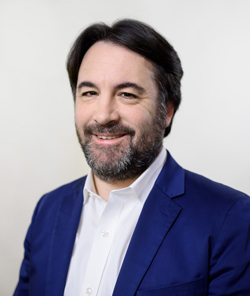From the April issue: What do you get when you cross an Iranian, an Israeli and a WASP from Long Island?
It sounds like the setup for a bad joke, but it’s the founding story of The Real Deal, which started 15 years ago this month. Check out the look back at the past decade and a half of our history — and that of New York City real estate — here.
Our publisher and founder, Amir Korangy, fled Tehran as a child during the Iranian Revolution, eventually making his way to the Big Apple. Our advertising director, Yoav Barilan, left behind communal living in a kibbutz in Galilee before befriending Amir in college. Meanwhile, my journey involved only a 30-minute train ride, which turned out to be a longer trip spiritually than geographically.

Stuart Elliott
We all met in Amir’s apartment in Prospect Heights, Brooklyn, near the start of the millennium because he had an idea for a new publication. He was investing in brownstones, and there wasn’t anything out there that covered what was really going on — nothing on the big deals and dealmakers, nothing focused on the kind of news that people in the industry could use. All the city’s brokers were reading feature stories in the Sunday New York Times real estate section instead. We could provide transparency about the market, and a level playing field for everyone, from everywhere, Amir said. It sounded like a good idea.
And here we are a decade and a half later. Our trio grew into a 70-person company, with the blood and sweat of other veterans such as senior editor Jill Noonan and research director Adam Pincus, alongside newer stars heading up editorial and advertising, who are drivers of TRD’s growth in 2018. We’ve spread out to new cities, including, if you haven’t heard, a new website for Chicago launching this month.
But our founding friendship — between two people whose countries are sworn enemies — and that mission, to “follow the money” as it sloshes around the city and around the world, are even more important today than when we started.
This publication began at the birth of the condo boom in 2003. If the attacks of Sept. 11 brought violence from the rest of the world to our doorstep, then the condo boom brought the ill-gotten riches from abroad. That foreign money helped create business networks that are now being investigated for infecting our government at the highest level (though you might disagree with that premise if you are a Trump supporter).
That wasn’t at all apparent when we first started reporting — when the focus during the building boom was on the coolest new amenities, like pet spas and concierge services.
These days, election meddling in the U.S. and nerve agent attacks in Britain are a clear part of what’s starting to shift the lax attitude toward illicit foreign money getting parked in real estate. The answer to this problem is not nativism but a targeted approach to shining a light on corruption and enacting reforms that will benefit the country’s health, as well as its real estate markets, in the long term.
Our cover story this issue, on diamond money being funneled into New York real estate, is one facet (pun intended) of our recent investigative reporting on this topic. There are more than 200 buildings worth more than $20 billion in the city that were built or acquired by developers who got their start in the diamond trade. As reporter Konrad Putzier puts it: In most cases, the investments are legitimate. Sometimes, though, they aren’t. “Gemstones are a popular tool to launder money, and real estate often provides the final rinse,” he writes.
It’s an exciting and important time for all of us, and I’m looking forward to our next 15 years of coverage. From our founding back in 2003, I’d like to think TRD shows what is best about this melting-pot city — an example of unity over division and of transparency over the shadowy.
Enjoy the issue.
